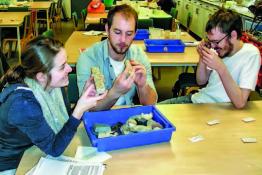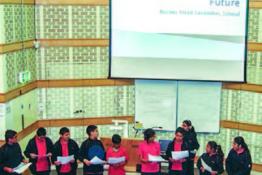Osmotic power: a fresh look at an old experiment
Issue 354 | Page 94 | Published Sep 2014
Description
Students are given the opportunity to try a lesser known method of providing an energy source. Electricity from osmotic pressure might seem a far-fetched idea but this article describes a prototype in Norway where the osmotic pressure generated between salt and fresh water drives a turbine. This idea was applied in a student investigation, where they were tasked with researching which alternative materials could be used for the semipermeable membrane and how advances in nanotechnology could provide a suitable material allowing full-scale power stations to be built. This link between nanomaterials and large-scale power production came as a surprise to the student group.
More from this issue
Reconciling the language and descriptions about energy in public discussion and the classroom. A key challenge in designing a teaching programme...
The development of ESEU's new carbon-based CPD workshop is described, to give a flavour of the experience it might provide to science...
Recognising that energy supply is just part of the requirement for sustainability for the world population. This article describes how energy...




